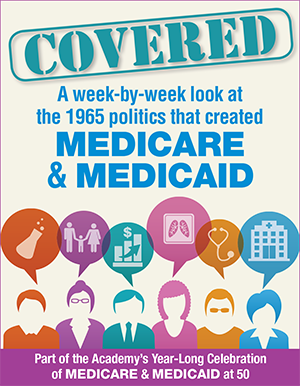Bob Rosenblatt, Special Correspondent
Welcome to Covered: A Week-by-Week Look at the 1965 Politics that Created Medicare and Medicaid. Bob Rosenblatt, a Senior Fellow at the National Academy of Social Insurance, former Los Angeles Times Washington correspondent, and editor of the website HelpWithAging will blog on the maneuvers that led to the enactment of Medicare and Medicaid on July 30th, 1965 the first major expansion of U.S. social insurance to health care.
This Won’t Hurt A Bit – White House Reassures Docs, Hospitals on Medicare
February 20, 1965
Bob Rosenblatt, Special Correspondent
Washington, DC — The Johnson Administration’s plan to pay for hospital care for Americans over the age of 65 would cover the daily cost charged by the hospital, but it wouldn’t apply to much of the work performed by the doctors a patient sees, a key Administration official told the Ways and Means Committee meeting in executive session this week.
For example, the cost of surgery would not be paid for under the plan since only a small group of specialty physicians would have their services covered, Social Security Commissioner Robert Ball told the closed-door hearing. But services of anesthesiologists, radiologists, and pathologists would be covered, according to Ball, at least if they are staff members at a hospital. If the doctors have independent medical practices, however, the patients are responsible for paying the bills.
This explanation by Ball was the clearest signal yet that the White House hopes to avoid a bitter fight with the medical community and with conservative members of Congress – many of whom insisted that the legislation must not interfere with a doctor’s freedom to set their own fees. “I would not want to write a bill myself that would disturb the right of an individual practitioner to do his own billing if he saw fit to do it, because then you get into a form of standardization,” said committee member John C. Watts (D-KY). But the limited coverage means that patients could still face substantial hospital bills even under the Administration’s plan.
Ball’s reassurances to the committee that doctors will remain independent in their billing appears to be part of a bigger strategy to reassure players in the current system that they won’t be subject to any radical changes if the Administration proposal, called Medicare, becomes law.
Hospitals welcome new revenues in the form of federal dollars, but they don’t want changes in current payment arrangements. Here, too, the Administration offered reassurances. Payments will be managed by organizations like the Blue Cross insurance providers. In return, hospitals are backing the bill.
Hospital administrators “would feel much more comfortable in dealing with an administrative agency with which they have had constant contact through the years than with a government agency with which they have little or no familiarity,” Kenneth Williamson, associate director of the American Hospital Association, told the Ways and Means Committee.
Under the proposed bill, the Secretary of Health, Education and Welfare can designate an organization outside the government to manage payments to hospitals.
“We believe this provision to be most important, “said Williamson. “It is the feeling of the hospital field that it should have an administrative agency of its choice functioning between the individual and the federal government. We believe without question that hospitals will choose the national Blue Cross Association as that agency.”
The Administration strategy is becoming clearer: offer a new benefit, but make sure it is tailored to reduce the conflict and reassure powerful groups, such as the doctors and the hospitals, that it won’t hamper their traditional, profitable ways of doing business.
► See the next post in the COVERED series: “Docs and Labor Escalate Fight Over Health Plan for the Elderly,” February 27, 1965
► Learn more about the Academy’s celebration of the 50th anniversary of the enactment of Medicare and Medicaid

